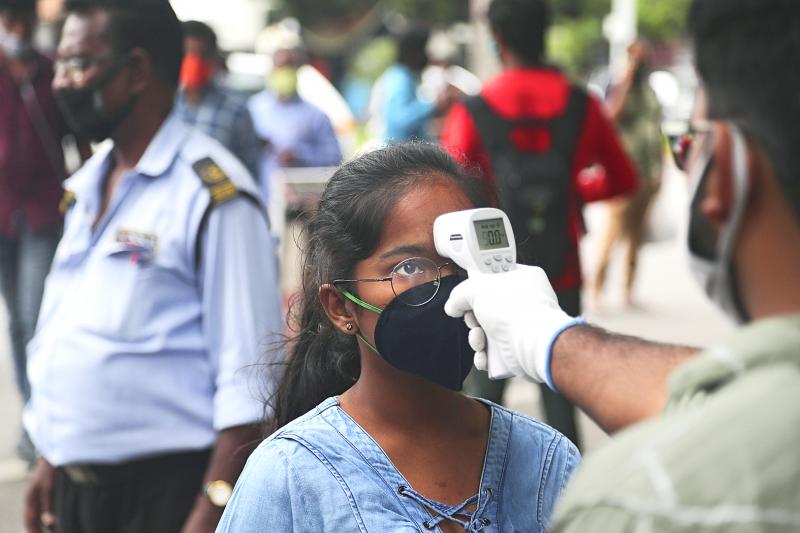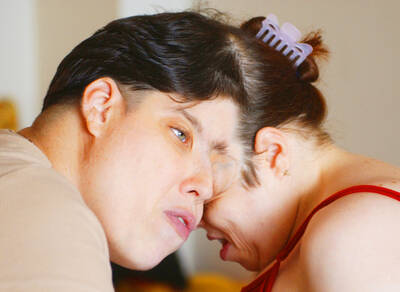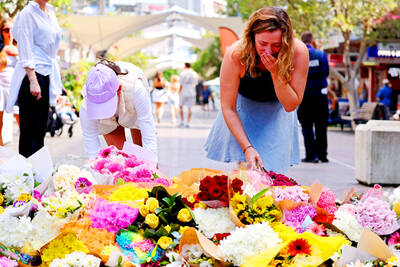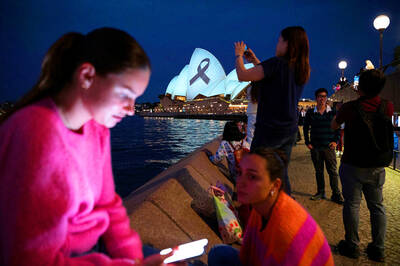India has registered a single-day spike of 94,372 new confirmed coronavirus cases, driving the country’s overall tally to 4.75 million.
The Indian Ministry of Health and Family Welfare yesterday also reported 1,114 deaths in the past 24 hours, taking total fatalities up to 78,586.
Even as infections are growing faster in India than anywhere else in the world, the number of people recovering from the virus has also risen sharply.

Photo: AP
The country’s recovery rate stands at 77.77 percent and nearly 70,000 recoveries have been reported every day this month, according to the ministry.
The ministry attributed India’s COVID-19 recovery pace to aggressive testing and prompt surveillance, but experts say India needs to test more due to its huge population.
It has climbed to the second worst-hit country behind the US, and is now testing more than 1 million people every day.
The Indian parliament is expected to resume work today with strict physical distancing. It adjourned in March just before a nationwide lockdown was announced to contain the pandemic.
The harsh lockdown caused a severe economic crisis, with India’s economy contracting nearly 24 percent in the second quarter, the worst among the world’s top economies.
In other developments in the Asia-Pacific region:
Domestic air travel in Wuhan, the epicenter of the global COVID-19 outbreak, has returned to pre-pandemic levels. Since reopening in early April after a draconian 76-day lockdown, life has gradually returned to normal and numbers of domestic flights serving the city, as well as the number of passengers, had both fully recovered, according to the operator of Wuhan Tianhe International airport.
It says 64,700 passengers were transported aboard 500 domestic flights on Friday.
The airport is preparing to eventually resume international flights to destinations such as Seoul, Singapore, Kuala Lumpur and Jakarta, an airport representative was quoted as saying by Xinhua news agency.
International cargo routes have already reopened connecting the major industrial city and center of the Chinese auto industry with destinations such as Amsterdam and New Delhi.
China has gone almost a month without registering a new case of local transmission and yesterday, the Chinese National Health Commission reported just 10 new cases, all of them imported.
Thailand is tightening monitoring measures at border checkpoints to prevent the spread of COVID-19 from neighboring countries, the Thai Ministry of Health said.
Local health volunteers would patrol natural borders with Myanmar, Cambodia, Laos and Malaysia, and watch out for the smuggling of foreign workers, it said.
Thailand yesterday reported seven imported cases, raising its total to 3,473. Fifty-eight people have died from the virus.
The Indonesian Ministry of Health yesterday reported 3,636 new cases and 73 new deaths.
South Korea is relaxing social-distancing rules in the greater Seoul area as the number of confirmed cases tapers after last month’s surge.
South Korean Prime Minister Chung Sye-kyun yesterday said distancing requirements would be lowered to level 2 from level 2.5 for two weeks.
The announcement came hours after the government confirmed 121 new cases, the second-lowest total in the past month.
“We shouldn’t let our guard down, given one out of four cases can’t be traced back,” Chung said in an address televised on Yonhap TV. “But tighter quarantine is showing its effect slowly.”
However, Chung warned of tougher social distancing rules during the Chuseok holiday — the Korean harvest festival — from Sept. 30 to Oct. 2 and urged people to stay home.
Level 2 forbids indoor gatherings of 50 or more people, affecting everything from weddings to amusement parks, but as of today, franchise coffee-shops can resume normal operations after being restricted to take-outs, while restaurants and bakeries can return to normal hours and indoor gyms and hagwons — private cram schools — are to reopen.
In Australia, Victoria, the state with the nation’s highest transmission of the virus, has recorded a small rise in new cases, the Department of Health and Human Services said yesterday, ahead of plans to ease one of the world’s strictest community containments as of midnight last night.
Forty-one new cases were reported in the past 24 hours and seven new deaths, it said in a Twitter post yesterday morning.
Meanwhile, Melbourne police arrested 74 people and fined 176 for flouting stay-at-home orders to protest against lockdown restrictions, with some demonstrators clashing with riot police at the central Queen Victoria market.
About 250 people took part in the illegal protest — the second in as many days in the city — promoted by coronavirus conspiracy groups on social media.
They were met by a heavy police presence, with scuffles breaking out as the riot squad swept through market’s fruit and vegetable aisles.
One man believed to be a “primary agitator” is facing charges of incitement, the police said.
Additional reporting by agencies

Conjoined twins Lori and George Schappell, who pursued separate careers, interests and relationships during lives that defied medical expectations, died this month in Pennsylvania, funeral home officials said. They were 62. The twins, listed by Guinness World Records as the oldest living conjoined twins, died on April 7 at the Hospital of the University of Pennsylvania, obituaries posted by Leibensperger Funeral Homes of Hamburg said. The cause of death was not detailed. “When we were born, the doctors didn’t think we’d make 30, but we proved them wrong,” Lori said in an interview when they turned 50, the Philadelphia Inquirer reported. The

IN PURSUIT: Israel’s defense minister said the revenge attacks by Israeli settlers would make it difficult for security forces to find those responsible for the 14-year-old’s death Israeli Prime Minister Benjamin Netanyahu on Saturday condemned the “heinous murder” of an Israeli teenager in the occupied West Bank as attacks on Palestinian villages intensified following news of his death. After Benjamin Achimeir, 14, was reported missing near Ramallah on Friday, hundreds of Jewish settlers backed by Israeli forces raided nearby Palestinian villages, torching vehicles and homes, leaving at least one villager dead and dozens wounded. The attacks escalated in several villages on Saturday after Achimeir’s body was found near the Malachi Hashalom outpost. Agence France-Presse correspondents saw smoke rising from burned houses and fields. Mayor Amin Abu Alyah, of the

Australian police yesterday said a 40-year-old itinerant with mental illness was behind a Sydney shopping center stabbing rampage that killed six people, including a new mum whose nine-month-old baby is still in hospital with serious wounds. New South Wales Police Assistant Commissioner Anthony Cooke said the assailant — who was shot and killed by a senior police officer at the scene on Saturday — was Queensland man Joel Cauchi. Five women and one male security guard were killed in the attack as Cauchi roved through a packed shopping center in the city’s Bondi Junction neighborhood with a large knife. Twelve more people

A prominent Christian leader has allegedly been stabbed at the altar during a Mass yesterday in southwest Sydney. Bishop Mar Mari Emmanuel was saying Mass at Christ The Good Shepherd Church in Wakeley just after 7pm when a man approached him at the altar and allegedly stabbed toward his head multiple times. A live stream of the Mass shows the congregation swarm forward toward Emmanuel before it was cut off. The church leader gained prominence during the COVID-19 pandemic, amassing a large online following, Officers attached to Fairfield City police area command attended a location on Welcome Street, Wakeley following reports a number